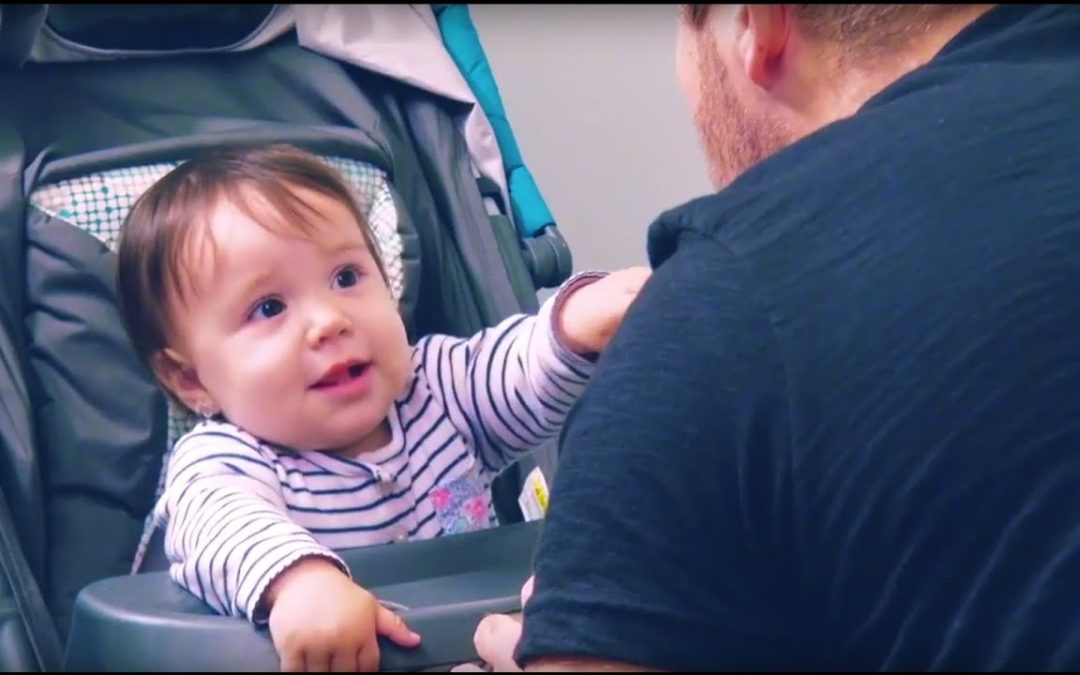Humans are born ready for connection. The way we are parented has long term and ongoing effects on our functioning. The effects of our early life can trigger a cascade of changes genetically, cognitively, socially, and physically which can have either positive or negative lifelong consequences. The ‘still face’ experiment is a powerful study which shows our need for connection from very early in life. This experiment was developed by Dr Ed Tronick in the 1970’s. The still face experiment gives an insight into how a parent’s reactions can affect the emotional development of a baby. Early in our lives we were learning about other people’s reactions and how our behaviour can affect others. This experiment gives us insight into what it is like when connection does not occur.
Baby’s reaction to the still face experiment.
This experiment involves a baby and parent (in this case the mother) sitting facing each other. The mother starts by playing with her baby, smiling at them, and talking to them. The mother then turns away. The next step is that the mother shows a still face or a lack of responsiveness to her baby for 2 mins. After the still face portion of the experiment there is a repair when the mother returns to normal and returns to playing with and talking to her baby. The interesting part of this experiment is not the actions of the mother but rather the reaction of her baby. You start by seeing a smiling happy baby who is engaging with her mother. The baby is making movements and sounds to communicate with her mother and responding to her mother’s interactions with her.
Once the still face portion of the experiment begins the baby at first looks confused. She attempts to use all of her abilities to initiate a response from her mother. Babies are limited in the types of sounds and movements they can do, and you see the baby in this video using a range of ways to try to get her mother’s attention. She looks around the room, she tries smiling, then pointing. As her attempts to connect continue to be ignored by her mother you see her start to show distress and frustration. She begins crying and then screeching. Babies in this experiment often loose postural control. Their central nervous system become so overwhelmed that they physically collapse. This baby also bites her own hand which may be an attempt at self-comfort. This baby dissolves emotionally and it can be uncomfortable to watch her distress. Towards the end of the experiment the baby becomes withdrawn and hopeless no longer attempting to get her mother’s attention.
After the still face portion of the experiment when the mother returns to interacting with the baby. You can see the joyfulness of the reunion and the relief is clear. The baby is quickly able to regulate its emotions once the mother is present again and play resumes easily. The still face is an example of the common everyday occurrences which all parents experience where they need to finish cooking dinner or attend to another child. Having a non-responsive parent is not a problem if it occurs in short doses, however if it occurs over longer periods it can have a detrimental impact on the baby’s development.
Dads you are just as important
This video demonstrates that babies react just as strongly to their fathers ‘still face’. Babies demonstrate the same behaviours seeking connection to their father as they do with their mothers. Fathers are often left out in this type of research and it is important that fathers understand how important they are in their child’s life.
What about romantic relationships?
This video uses actors, but this is not an uncommon scenario in couples’ therapy. You can see that one partner shows less emotional reaction and connection. You can see that the wife is using similar behaviours to those displayed by the babies in the previous clips to get a reaction from her husband. She is desperately attempting to engage with him emotionally.
So, what does the ‘still face’ experiment show?
The ‘still face’ demonstrates how vulnerable we all are to the emotional or non-emotional reactions of the people they are close to. It demonstrates how babies who are just learning about their relational world try to achieve connection. Babies were once thought to be unable to understand emotions. However, in this experiment they have a clear reaction to a lack of emotional connection from their mothers and fathers. Even very young babies have demonstrated that they can respond to emotions of the adults who care for them. Not only are babies able to passively respond to adult interactions but babies are also actively engaging and shaping social interaction with the adults in their lives.
In this scenario, a pattern has been discerned with regard to a number of common stages and reactions. These occur in humans of all ages who are seeking emotional connection. The first stage is the reach which is generally a physical movement of arms out. The second stage the protest is an attempt to engage the other person with emotion to obtain a reaction. The third stage is the turn away when the baby is so overwhelmed trying to get a reaction, they will look around the room or turn away from the parent. The fourth stage involves a final effort to get a connection and usually involves visible distress. This occurs because the baby is so dysregulated and desperate for connection, they use the only means they have of communicating which usually involves crying. The final stage involves the baby ceasing to attempt to get an emotional reaction from the parent. In a healthy relationship there is a reconnection as shown in the videos and this leads to the ability to repair the hurt that has occurred in the relationship.
What if the ‘still face’ occurs over a long period?
There are many reasons a parent may struggle to be emotionally present with their children. Some parents have head injuries or illnesses which make it difficult to show appropriate emotional reactions. For parents in situations where there is domestic violence it can be difficult to show emotions. Drug and alcohol use can also impact emotional availability and both intoxication and the resulting hangover can blunt emotional expression. Parents experiencing severe depression or other mental illness may also struggle to engage with their child. Phones have also become a major part of our lives and it is not uncommon to see parents disconnecting from their children while using their phone. If you had a parent who was not responsive you may struggle yourself and repeat this behaviour with your own children. What is life like for babies whom experience the two minutes of still face for long periods of time? Research has shown that children who have parents who are not responsive to their needs have more trouble trusting others, relating to others, and regulating their emotions.
Questions to ask yourself:
- Do you struggle at times to show your emotions?
- Do you feel shut down?
- Do you have people in your life who tell you they want to see more of an emotional reaction from you?
- Were there emotions that were unacceptable to show in your household when you were a child?
- Do you find it challenging to understand your child’s needs?
- Are you so exhausted or overwhelmed with life that you find it difficult to smile or talk to others?
If you are a parent struggling to connect with your child or there is something preventing you from being responsive to your child’s emotional needs seeing a PsychHelp Psychologist can help. Learning to understand your child’s emotional reactions and needs can help you to connect with your child. If you had a parent who experienced problems connecting with you this can have ongoing impacts on your mental health and general wellbeing. Seeing a PsychHelp Psychologist can give you new insights into what you needed as a baby and help you to identify ways to have these needs met as an adult.



This is so helpful to understand how important the repair aspect of emotional disconnection is to forming a safe and secure bond. Watching this with my partner helped us understand how we have become naturally skilled at repairing when we disconnect. And also gives us confidence in one day knowing how to emotionally engage with our future babies.
This page certainly has all the information and facts I needed about this subject and didn’t know who to ask.
Heya! I understand this is sort of off-topic but
I needed to ask. Does running a well-established blog like yours take a massive amount work?
I am brand new to operating a blog however I do write in my journal everyday.
I’d like to start a blog so I can share my experience and feelings online.
Please let me know if you have any kind of recommendations or tips for new aspiring blog owners.
Thankyou!
We absolutely love your blog and find the majority of your post’s to be what precisely I’m looking for. Again, awesome web log!
Hi there, I enjoy reading all of your article post.
I wanted to write a little comment to support you.
I simply want to mention I’m new to blogging and site-building and certainly savored your web site. Very likely I’m going to bookmark your site . You definitely come with exceptional writings. Thanks for sharing with us your webpage.
Everyone loves it when folks get together and share ideas.
Great website, keep it up!
Thank you for another essential article. I wish I had your passion for writing!
This is how my mother was/is with me, from birth. My father, in his own way, was not responsive either. There was never, ever physical or verbal affection in the house. “Ambivalent” is the word I used upon telling my mother how she has always been with me. Both parents were utterly unfit to be parents.
Now, 50+ years later I am quite sure of the life-long damage this type of upbringing causes. I have profound difficulties ‘reading’ people, or being ‘read’ as I am feeling at the moment. I don’t fit in anywhere.
Wish my family had been so different from what you describe that I couldn’t imagine such a life. Regrettably mine was so similar I wondered if I’d written the comment and didn’t remember.
I feel such deep pain from repeated psychological and emotional damage. I long for it to end.
This hits home. I was diagnosed with autism 5 years ago, during the assessment I also found out my mother had a post partum depression lasting 1.5 years. There were also a lot of arguments between my parents as a kid, in which I started to see my mother as the ‘bad one’. I’ve always had the issue that my tolerance level towards my mother was and is still low. She annoys me with small things.
I think this also has impacted my ability to deal with relationships and together with other people. I am an only child.